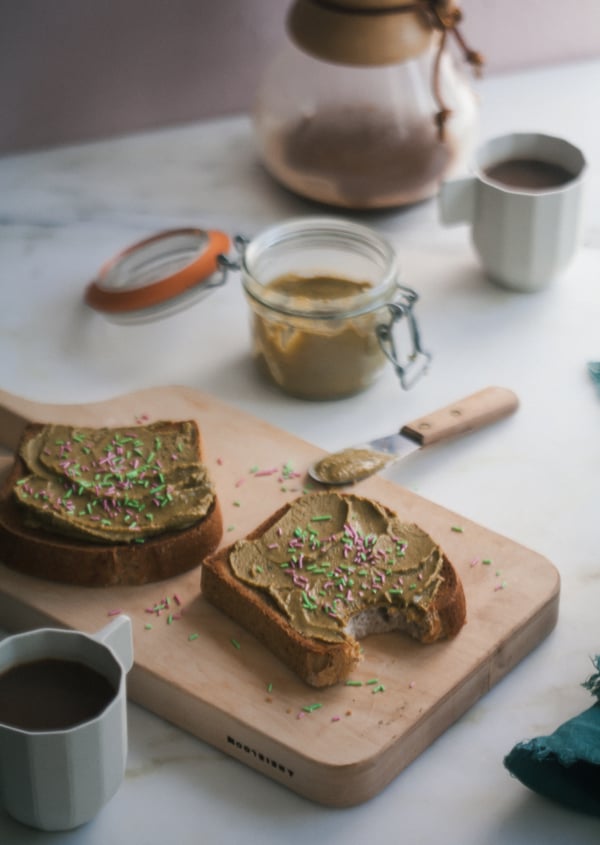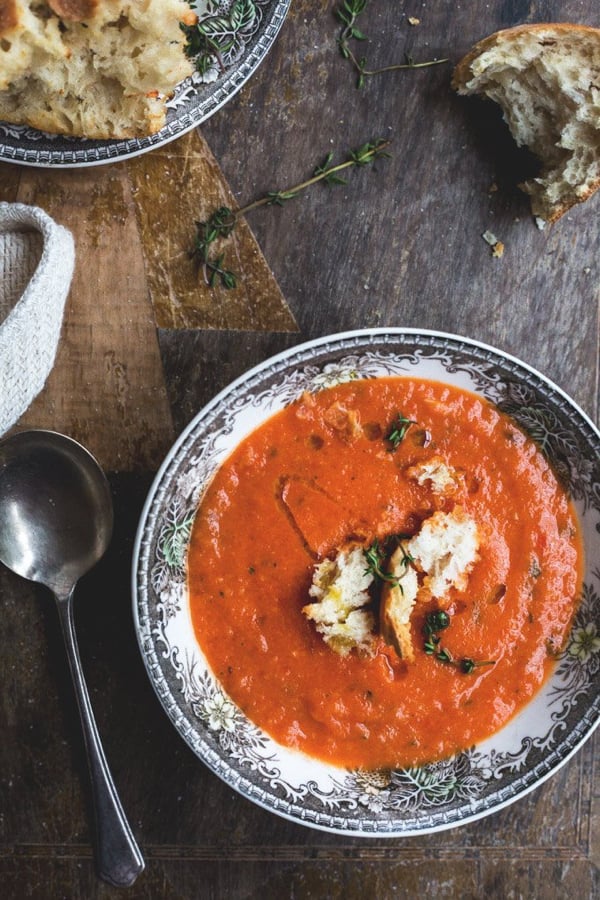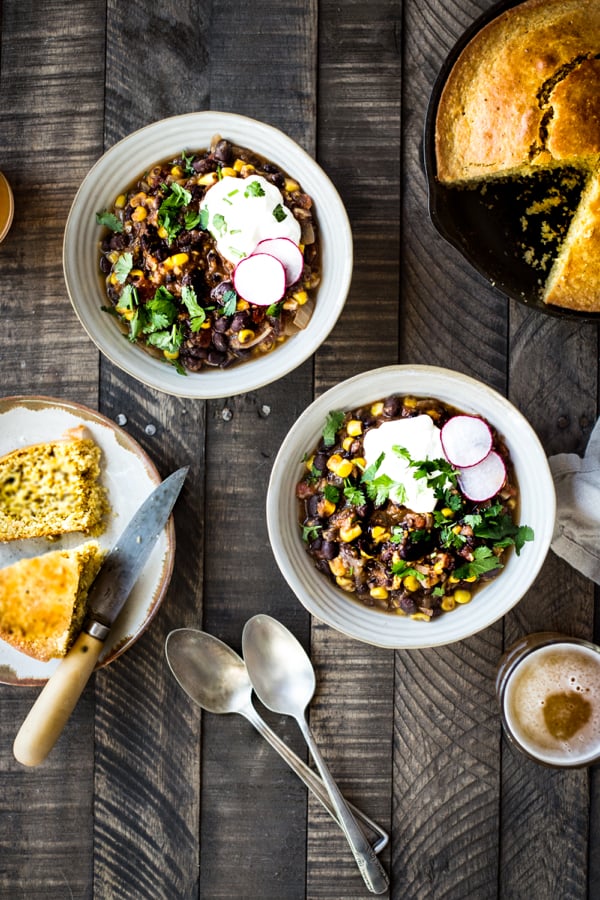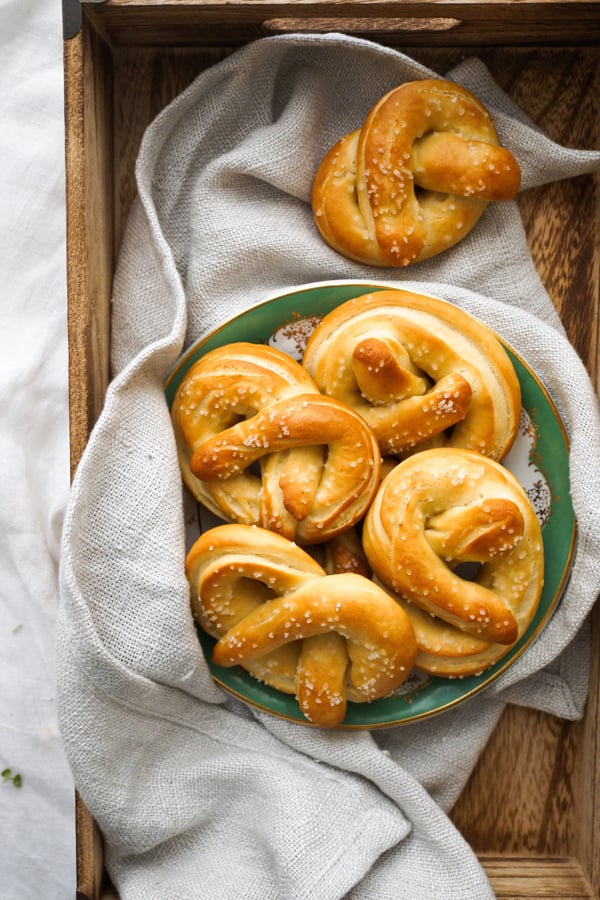Hello, hello, and happy Sunday. It’s been a week of highs and lows here: September’s customary temperature swings, some ups and downs in mood, and some recipe testing triumphs followed up by a couple of spectacular fails. It’s all keeping me on my toes.
On Monday evening, a friend invited me to check out a new play, called Aubergine. It’s the story of a chef, Ray, whose father has recently entered hospice care. In nursing his dying father, Ray is forced to confront his childhood, his Korean heritage, his recent breakup, and his sense of identity–as a professional, a lover, and a son–all at once. He navigates the experience under the watchful guidance of a hospice worker, his ex-girlfriend, and his uncle, the brother from whom his father was estranged.
I found the play incredibly touching. It’s hard for me not to appreciate any work of art that examines the human condition through food. The play is peppered with lots of food/life metaphors, and sure, I’ve heard some of them before. But they resonate, all the same.
Throughout the play, Ray’s concerned onlookers are continually urging him to eat; in being confronted with his father’s death and assuming the role of caretaker, Ray has quit being a chef, at least temporarily, and stopped cooking. He resorts to takeout or forgets to eat altogether, and he insists angrily that there’s no point in preparing food; his father is no longer able to eat. Of course, those around him counter that it’s not Ray’s father that needs nourishment. It’s Ray himself. He needs sustenance in order to survive the loss that’s coming.
In spite of his expressed skepticism, Ray harbors a hope that, by some miracle, he can create a dish so special that it might bring his father back to life, or bring him some comfort, or if not that, at least create a bridge of communication between the two men, who have never had an easy relationship. That Ray’s father has never respected his work–“it’s women’s work,” he says with disdain–only compounds Ray’s desperation to prove his worth through food.
In the end, this coveted moment of connection doesn’t really arrive. But healing happens, anyway, and Ray does begin to cook again. Ray’s father wasn’t able to receive and appreciate Ray’s talent, but many others will.
Reconciliation is something that many of us–maybe most of us–tend to seek and crave, either because it’s what we want or because it’s what we believe we should want. We may despair when amends can’t be made, which happens: sometimes there’s too much history between two people, and sometimes a person is gone. Aubergine‘s playwright, Julia Cho, seems to be suggesting something that I want to believe, which is that healing is possible even when the moment of communication or shared understanding that we’d hoped for proves impossible.
Underneath all of this runs the idea of food as part of the healing process. Communication can fail, timing can be bad, opportunities are missed. But we can take care of ourselves; we can nourish our bodies, bite by bite, and what this act communicates is that we want to keep going. It’s an idea that I’ve clung to in moments of confusion or grief or feeling stuck. I may not be able to make sense of things, but I can choose to make myself dinner; I can put something wholesome in my body and trust that if nothing else, there is value in that act.
I’m linking to something Julia Cho wrote about Aubergine as one of my reads this weekend; she has some lovely things to say about food and what it communicates, within families and within a culture. In the meantime, lots of wonderful recipes to share this week.
Recipes
It’s fig season, which is something to celebrate each year while it lasts. I love and can’t wait to try this colorful and oh-so-simple fig, Israeli couscous, and walnut salad from my friends Amanda and Aaron over at Pickles & Honey.
I’ve experimented with dozens of different homemade nut and seed butters over the years, but this is the first time that I’d ever considered (or even heard of) coconut pistachio butter. Leave it to the playful, creative Adrianna to come up with this lovely idea, and then to top it with sprinkles.
The best and most wonderful kind of comfort food, courtesy of Amanda over at My Goodness Kitchen: oven roasted, garlicky tomatoes, being soaked up by heaps of day-old bread. I love everything about this, the end.
I’ve never really met a black bean chili I didn’t like. My black bean, butternut, and quinoa chili is the current favorite around here, but I’m always on the hunt for recipes. I love Andrea’s new recipe for black bean and corn chili, which features plenty of spices and beer for seasoning. (Easy to swap the regular yogurt for vegan yogurt, natch!)
I’m mighty impressed by Annett’s soft baked vegan pretzels with maple mustard dip, and even though I’m 95% sure that I could never replicate anything that pretty or authentic, I may just have to try. Crunchy pretzels have never really been my jam, but I do love the soft ones, and these look perfect.
Reads
1. I haven’t yet tried the Impossible Foods hamburger; one can get it here in New York (if you can snag a table at Momofuku Nishi), but I admit, I haven’t been tempted. There are many faux meats I love, but the extent to which I crave an authentic (i.e. bloody) hamburger is truly minimal.
That said, this fascinating profile of Patrick Brown, the founder of Impossible Foods, has at least piqued my curiosity about the burger, and it has me pretty excited about continuing disruptions in our food system.
2. Whitney McKnight profiles a new app that is designed to help individuals who may be experiencing the early signs of schizophrenia to safely connect with healthcare providers. It’s an interesting, provocative look at developments in the healthcare industry, and it asks important questions about how our regard for the dignity of mental illness patients might be growing. McKnight suggests that the app might be evidence of
…an evolution in how we see one another as human beings, and how we can learn to trust that humans are actually capable of figuring out how to get through the day, even if we are at times unstable. Because the secured app is designed to generate and collect data about a person’s state of mind, reflections about one’s experiences with psychosis, conversations with others, and records of how a person dealt with moments of instability, it captures “life with psychosis” in real time, and preserves it so that the people living with the illness can partner with their clinician to review the body of work they have created in response to their illness, rather than be seen as their illness.
The app demonstrates that we can develop coping strategies for our sometimes unpredictable minds, when given the freedom to do so.
This is wholly different from affected persons having to trundle themselves to a clinic, absorb (and possibly reject) the often silly exigeses of who they are as defined by bureaucracy, and be “examined”, which implies that they are a specimen, not a person.
Beautifully put. It’s well worth reading McKnight’s reporting and also her interview of Dr. Danielle Schlosser, principle investigator at the lab that is pioneering the app.
3. Good news: a few promising trials are underway to encourage food banks to help their clients who are suffering from Type II Diabetes.
Oftentimes the selection at banks and food pantries is limited to foods that may exacerbate, rather than remedy, symptoms of the disease. Now that physicians are being directed to ask about food insecurity during appointments, they’re also becoming invested in helping their patients to access healthful groceries. This has led to the early implementation of healthcare screenings and treatment guidance at banks, along with more pressure for banks and pantries to stock fresh produce. Hopefully, the model will catch on.
4. A wonderful, short profile of Marie Tharp, whose work as a geologist helped to prove the theory of plate techtonics and continental drift. It’s worth reading not only to get to know Tharp (I’d never heard of her before I stumbled on this), but also because her story depicts a pretty remarkable triumph over sexism in the sciences.
5. And finally, Julia Cho’s reflection. She remembers her father, who loved ramen, and she writes about the imprint that this dish has had on her life. I was touched by her closing works, which may resonate with any of you who have lost a loved one and choose to honor that person’s memory through food:
I bring up these two dishes because when someone dies, one of the harder aspects is that you no longer get to eat with them. There are some religions that construct altars for their dead and leave food for them to have in the afterlife. I know one friend who put a Pepsi and a donut on the altar for his grandmother because those were her favorite foods. For my father, I would put ramen and jjamppong. But being Christian, we have no altars. So instead, I eat ramen, now sharing it with my own children, who lap it up with an almost primal instinct as I have yet to find a child who doesn’t like noodles. And should I be so lucky to be in LA’s Koreatown, I go to Young King and order their jjamppong. I think of my father — this man who ate out so rarely, who gave himself so few material luxuries that when he died, he left almost nothing to inherit. He grew up in a time and place where there were no cameras; of his early life, or even his life as a young man, I know virtually nil. But I know what he ate; I know what foods he liked. And so it is a kind of communion: I eat these things in remembrance of him.
Enjoy the reads, enjoy the links. And I look forward to sharing a (very easy) new recipe with you in a couple days.
xo
You might also like
Do you ever have a week of complete absentmindedness? I sure did. I’ve been misplacing everything this week, from earrings to a hat to (somehow) the top of my burr coffee grinder. Most hilariously, I couldn’t find my keys in my own apartment for an entire 24 hours. Good thing I had a spare set handy. There’s a difference between losing something and misplacing it, though. Funnily enough, I ended up finding most of the things that went missing this week. And it’s…
I can’t believe it’s already June—it seems as though last August was only yesterday, and I was staring down the long road of the dietetic internship. Everyone assured me that the year would fly by, and in the aggregate it has, though some of the rotations have felt endless. My current rotation is one of those, which makes the DI finish line of late July feel farther away than it is. The only way out is through, so until this rotation is behind…
Last weekend, I mentioned that I have a tendency to try to fix or manage difficulties as soon as they arise. This can be a good thing, at least when it comes to concrete problems that demand ready solutions. It can also be a handicap, especially when the issue at hand defies easy troubleshooting. In trying to “fix” something that’s inherently complex, I sometimes create difficulty, rather than alleviating it. When this happens it’s often because I appeased my aversion to discomfort–I wanted the problem to go away quickly, so…
I’ve been reading a lot of Pema Chödrön’s writings about tonglen practice lately. One quotation of hers keeps sticking with me: Tonglen practice (and all meditation practice) is not about later, when you get it all together and you’re this person you really respect. You may be the most violent person in the world—that’s a fine place to start. That’s a very rich place to start—juicy, smelly. You might be the most depressed person in the world, the most addicted person in the…







Leave a Comment
Like you, Gena, I appreciate the disruption but have no desire to try the Impossible Foods hamburger. Thank you for your thoughtful post.
Thank you for the recipe love, Gena! I always learn something new when I read your Weekend Reading posts. I’m curious about the Impossible Foods hamburger, but I also personally find it a little repulsive? I have weird, conflicting emotions that I’m probably only experiencing because I associate anything resembling real meat with sadness. That said, I think it’s awesome as an option for people who crave an authentic but plant-based burger. I’ll just take a bean burger, please. 😉
Thank you for the recipe love, Gena! I always learn something new when I read your Weekend Reading posts. I’m curious about the Impossible Foods hamburger, but I also personally find it a little repulsive? I have weird, conflicting emotions that I’m probably only experiencing because I associate anything resembling real meat with sadness. That said, I think it’s awesome as an option for people who crave an authentic but plant-based burger. I’ll just take a bean burger, please. 😉
I love that piece on Marie Tharp! I’m a grad student in marine geophysics, and the Heezen and Tharp map is one of the great images that really sticks out in the history of plate tectonic theory.
Gena, what a beautifully written review of Aubergine! If more play reviews were that well written every night would be a sell out.